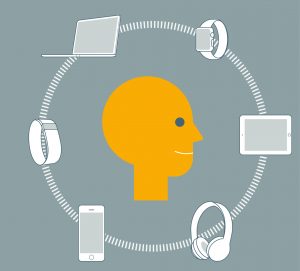Mal Lee and Roger Broadie
Recognise that in the school’s evolutionary journey and the quest to normalise the use of the digital you’ll be working towards a situation where the school is technology agnostic: where it doesn’t matter what personal technologies or operating systems those within the school community choose to use.
So long as the chosen technologies can readily access the Net as far as the school is concerned it doesn’t matter which folk choose. While it is likely wise for schools to provide continually updated advice, part of the trusting and empowering of the school community is letting each member make the choice of the desired personal technologies.
Let the user, the learner, the client decide.
We appreciate for many raised and trained during the Microsoft hegemony, who experienced the Apple – Windows ‘conflict’ and who believed that all in the school had not only to use the one operating system but also the same model of computer this will call might sound sacrilegious.
The technical imperative for the school to use the one operating system disappeared at least 5-6 years ago with the emergence of digital ecosystems able to readily accommodate the many different mobile operating systems. One has only to note the ease of providing all manner of smartphones, phablets and tablets instant access to the Net to appreciate why all schools to be technology agnostic as soon as feasible.
The assumption that all students and teachers must use the same hardware and software in the teaching and learning more to do with the
- desire by the school – and its ‘ICT experts’ – to retain unilateral control of all aspects of the teaching, learning and technology resourcing
- focus on the technology and its maintenance rather than on the desired learning
- belief the young learn best how to use the technology when taught in a highly linear lock step manner, with the teacher in control, with all using the same technology, often with the school being able to monitor every key stroke
- school’s distrust of and lack of respect for its students, parents and indeed most of its teachers
- school’s insular mindset that focuses on that happening within the school walls, to the virtual exclusion of any student usage of the digital in the real world.
As schools mature digitally, genuinely collaborate with their homes, socially network, come increasingly to respect, trust and empower all within the school’s community and create a culture and adopt a mindset where the use of the digital is normalised the control over thinking disappears.
All come to appreciate that what matters is the facility of the technology – or more likely the student’s suite of digital technologies – to perform the desired functions. In authoring an e-book it matters not whether the student uses an Apple, Android, Windows, Tizen or Firefox based system, or a mix thereof to create the final product. While the ‘ICT experts’ will have their preference so too will each client.
That said, one can mount a case for a graduated shift and schools with limited technology staff opting to stay for a time with a common operating system. However even those that have started this way soon open the doors for the students to use the kit they desire.
In embarking on your digital journey your school evolve at pace but so too will the technology and the practises one employs to derive the most from the current technology.
Work as fast as is feasible to shift from the traditional prescribed personal technology model to one that is technology agnostic.

